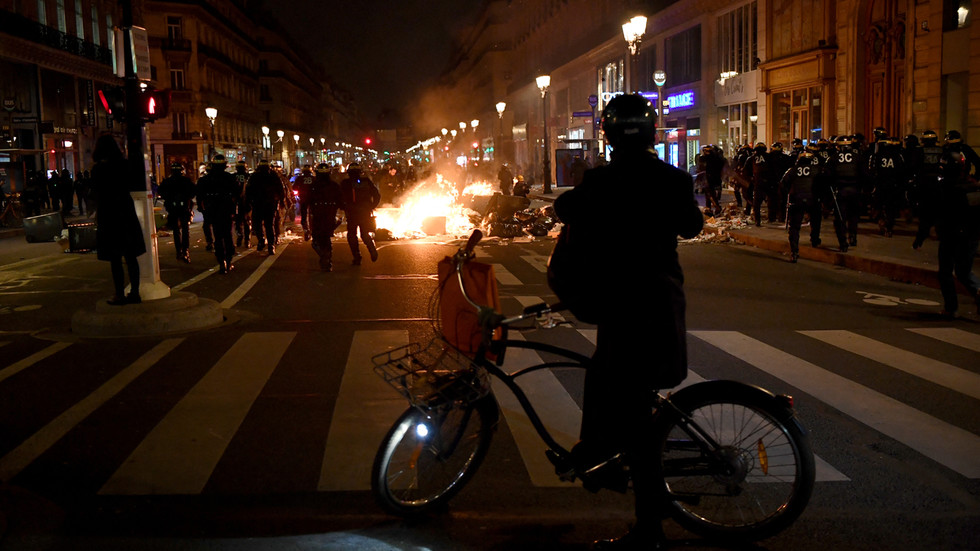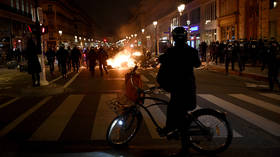
Violent unrest has continued across the country after lawmakers failed to depose the government over the debated bill

A biker stands in front of a fire during a demonstration on Monday in Paris. © AFP / Christophe Archambault
The French government has survived two parliamentary no-confidence votes over President Emmanuel Macron’s decision to push through a controversial pension reform bill without lawmakers’ approval. The failed motions on Monday were followed by renewed violent unrest overnight.
The first no-confidence motion, tabled by a small group of opposition lawmakers, garnered significant support in the National Assembly, dominated by Macron’s centrist alliance. The motion fell just nine votes short of the 287 required to pass. The second motion, put forward by the right-wing National Rally party, was backed by only 94 lawmakers.
Despite failing to pass the motions, some opposition lawmakers urged the government to resign anyway. “The government is already dead in the eyes of the French,” left-wing MP Mathilde Panot said after the votes. “It doesn’t have any legitimacy anymore.”
READ MORE: French MPs threatened with guillotine ahead of crucial vote
In wake of the no-confidence votes, France’s top police trade union, the SGP Police FO, warned that officers might no be able to contain the ongoing unrest. “We’re starting to run out of steam on the police side,” the union said, bemoaning the so-called “punch actions” by protesters, such as suddenly blocking roads and causing other disruptions.
1.Le syndicat Unité SGP Police FO s'inquiète des "actions coups de poing" qui se multiplient dans le pays après le 49.3"Les manifestants sont ultra-mobiles, se déplacent rapidement. On court un peu partout. Et on commence à pic.twitter.com/0ELxvRuM72
— 🍓Sined Warrior🐭🍓 (@SinedWarrior) March 20, 2023
The protests apparently lived up to expectations, with assorted chaotic footage emerging overnight. Multiple videos from the French capital city of Paris show barricades erected in the streets, with various objects set on fire.
#Paris brûle toujours, plusieurs corteges sauvages sont en cours dans la capitale. #reformesdesretraites#revolution#ToutCramer#greve20mars#reformedesretraites#reformeretraites#MotionDeCensureTransPartisane#DirectANpic.twitter.com/D8zHk9wYZh
— Jules Ravel (@JulesRavel1) March 20, 2023
The police were pictured repeatedly charging the crowds, beating individual protesters, apparently without attempting to detain them.
#Paris, charge et matraquage en série de la BRAV-M dans un cortège sauvage aux alentours de châtelet. #reformesdesretraites#blocage#DirectAN#ToutCramer#greve20mars#reformedesretraites#reformeretraites#MotionDeCensureTransPartisanepic.twitter.com/kMAk9DOfWP
— Jules Ravel (@JulesRavel1) March 20, 2023
The unrest is expected to continue across France into the coming days, with trade unions calling for a “maximum mobilization” and a “general strike” expected to kick off as soon as Tuesday.
Plusieurs dizaines d’interpellations violentes juste derrière la Bourse à Paris, lors d’une manifestation sauvage contre la #ReformeDesRetraites. Et la police (BRAV) a toujours autant de mal avec la liberté de la presse… j’ai fini par prendre un gros coup de bouclier dans le dos pic.twitter.com/6AkKiBIL8i
— THOMAS DIETRICH (@thomasdietrich0) March 20, 2023
Macron opted last week to push through the long-debated bill, raising the retirement age in France from 62 to 64, without parliament’s approval. The move only further fueled ongoing strife across France, with violent protests raging for weeks as trade unions voiced their opposition to the proposed measure.
The bill, however, is still pending a review by the Constitutional Council before it can be signed into law. While the body has powers to dismiss certain articles within a bill, should it deem them to be unconstitutional, the council rarely actually does so.




